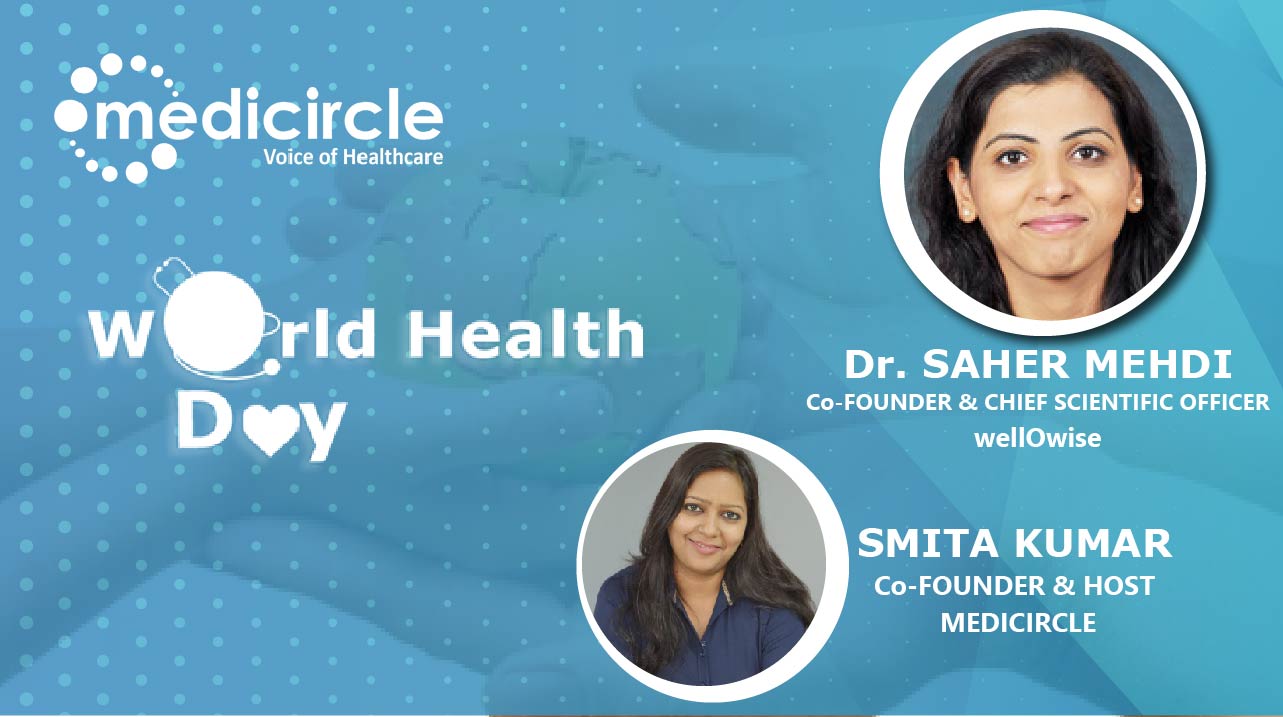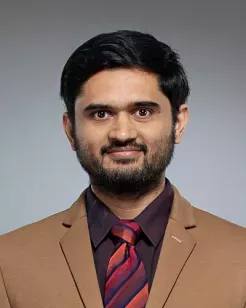The COVID 19 pandemic has highlighted the shortcomings of the healthcare industry, including preventative health, and has attracted very much-needed investments in health care. Global investments in healthcare start-ups had set a new record in 2020, reaching 80.6 billion dollars in equity funding. On this world health, we at Medicircle present to you the World Health Day awareness series, wherein we are interviewing the healthcare start-ups, which have created disruptions in healthcare through technology and innovative ideas.
Dr. Saher Mehdi is the Founder and Chief Scientist at wellOwise, which was founded with a vision to bring precision health to life for clinicians and people at large. She's a scientist turned entrepreneur with a keen interest in understanding the genetic and epigenetic basis of human health and disease. Saher has over 14 years of research experience starting epigenetics, mechanisms, regulation, cellular growth, aging, and stress.
Dr. Saher says, “the fact is known that India is one of the fastest growing economies. With over half a billion digital users or internet users, our economy is growing as fast as our aspirations. India has the second highest number of obese kids in the world. And with the access to the higher calorie food, with the lesser amount of time in our hand to burn off those calories, city getting crowded with the people, opportunity for outdoor activity becoming very less, all have led to an epidemiological transition. Infectious diseases that were first classified to be associated with a developing country, India too is moving to a chronic disease epidemic, because more and more people are becoming obese. The highest risk factors that are associated with chronic diseases like high blood pressure and high sugar, increased waist circumference, and an inactive lifestyle. COVID-19 has further highlighted the vulnerabilities of people suffering from these chronic diseases. So, the future of healthcare depends on how we tackle these risk factors early on. And I think the start-up scene has risen to the occasion, where we have seen a constant mushrooming growth with the aim to make healthcare more affordable, accessible, and actionable. Smaller start-ups are spurring innovation. They're injecting competition and improving the quality of the deliverables that patients are getting. Most importantly, they are supporting economies by skill training people and increasing job opportunities,” speaks Saher.
wellOwise – making healthcare proactive, preventive, and personalized
Dr. Saher informs, “The next big epidemic after corona that we are facing in India and globally is the chronic diseases. Unlike infectious diseases, chronic diseases don't happen in a day or so. They happen because of the accumulation of molecular damages over a long period of time. And that's predominantly because of poor nutrition, and a bad lifestyle. So, if we can capture these molecular damages early on before the symptoms appear, then we can not only reverse the disease but often delay the onset of really serious chronic diseases. Fact is well illustrated in the research that if we catch chronic diseases early, 80% of chronic diseases can be preventable. So, with that vision in mind, wellOwise is trying to make the healthcare more proactive, preventive, and personalized.”
Dr. Saher emphasizes, “We currently have two products in the market. The first one is our Revised Preventive Program, where we collect your genetic data, your lifestyle, your blood data, to assess your current health status, and look across 200 health markers within health, nutrition, fitness, wellness, and immunity. And then based on those insights and risk stratification, we give you a personalized dietary supplement and lifestyle intervention to either delay the disease or even reverse the disease. So, this is the preventive program for healthy individuals.”
Dr. Saher adds, “The second one is for the individuals who have already got chronic diseases, that is Revised Diagnostic Program, which basically helps the clinician to understand the causality of disease, molecular damages that have caused the disease and identify those precise microscopic damages. We can inform the clinician to find better treatment and therapeutic options that are more personalized. So, it's a step towards personalized medicine, primarily focused on neuropsychiatric and metabolic disorders.”
How to access wellOwise
Dr. Saher advises, “the whole program is built on a proprietary algorithm. So, as I mentioned, the genetic markers, the dietary markers, the lifestyle markers, and the blood markers help you assess the 200 risk markers across these various categories. People can join the program via our social media, print media, and our website. They can call us or get in touch with the social media or go on our platform and raise an inquiry and then one of our health advisors will call them and ask their personal leads, they just need to fill in their lifestyle form and get started on the program. The program currently runs PAN India, so anybody across India can join the program. The whole program is monitored from onboarding to the delivery of the actionable insights or the personalized dietary intervention, through a Health app, which is called the Revise Health app.”
Making healthcare equitable and reachable
Saher mentions, “the first thing to make healthcare equitable and reachable to all is the health education. And I think social media is playing a big role in it because half a billion people in India are internet users. Digital technologies, apps, and social media have a huge role to play in educating these people on the various platforms across social media on how and when to act. The earlier you act towards your health and be aware of what health risks you carry, take steps to mitigate those, the better chances of you living a healthier and longer life. Access is also a huge thing especially in the rural areas, I would say the digital technologies, public-private partnerships with startups, government hospitals can do a lot. Startups can collaborate with smaller government hospitals in remote areas and provide those digital services there, then it can reach the grassroot level,” suggests Saher.
Dr. Saher adds, “next is to identify the risks. It is the most standout feature in genomics, that genomics can predict disease from an instance before the disease happens, which can help you to capture these molecular changes before they actually happen. Because with what disease genes you are born with, you will carry these risks throughout your life. Aging, certain habits, and irritants accumulate over time and these markers get triggered. So, all the switches are switched on and off, as we say in epigenetics that trigger diseases. So, in order to reach the grassroots level, or to the level where people need the healthcare most, we need a risk stratification system in the Indian healthcare system. If we can stratify people on the basis of their age and risk factors they carry. Educating kids, at school and college levels can really change the thought process from the grassroot level. India is the second highest in childhood obesity, all these kids are growing up to become really morbid, obese, and chronically ill in the next 10 or 15 years of time. So important thing is to identify and proactive towards the disease, act with personalized information timely. So, the three aspects, precision prevention, and proactiveness is required to tackle healthcare and making it more equitable in long run,” speaks Saher.
(Edited by Renu Gupta)

 “We have seen a constant mushrooming growth in smaller start-ups that are spurring innovation with the aim to make healthcare more affordable, accessible, and actionable†Dr. Saher Mehdi, Founder and Chief Scientist at wellOwises
“We have seen a constant mushrooming growth in smaller start-ups that are spurring innovation with the aim to make healthcare more affordable, accessible, and actionable†Dr. Saher Mehdi, Founder and Chief Scientist at wellOwises










.jpeg)

















.jpeg)


